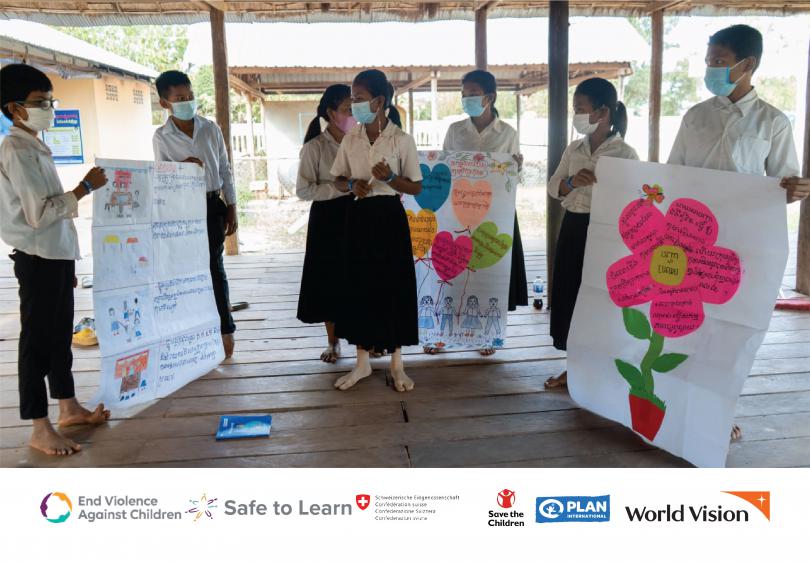A changed school Environment, shared by A Student Councils Member

Throughout the frequent school closures in 2021, due to the COVID-19 pandemic and lockdowns, Sovann Kannitha, a 12-year-old student, has been actively involved in learning and partaking in activities envisioned to end violence against children in and around the school.
Kannitha, at the time of reporting, studied in grade 6 at Hun Sen Svay Chek primary school, and is living with her parents and three siblings. Her father, Phal Sieha, serves as a civil servant and her mother, Yoeurn Horm is a housewife. She has been known as an outstanding student throughout her primary school life.
Kannitha was among 91 students (51 girls) in grade 6, who were voted as vice chair of the student council’s leader,with roles and responsibilities including leading, facilitating, and participating with other students to implement school activities, with support from her teachers, designed to create a clean and safe school environment.
The role provided her the opportunity to identify many undesirable behaviors occurring at school, Kannitha said, “At my school, there were incidents of child-to-child violence, fighting, shouting, psychological bullying, harassment, and corporal punishment by teachers.”
“I did not know and could not identify types of violence against children and who should I report the problem to for intervention. My school did not have any reporting pathways, and no school-based child protection structure. What I could do was only to inform teachers on a case-by-case basis,” she said, noting that all these issues have later been addressed.
In the 2020 - 2021 school year, Hunsen Svay Chek primary school had been selected to implement Ending Violence Against Children in and around Schools in Cambodia (END VAC) project with funding support by the Global Partnership to End Violence Against Children (End Violence).
In partnership with Save the Children, Plan International Cambodia and in collaboration with Provincial and District of Education Youth and Sport (P/DoEYS) a child-safe culture where all students including those with disabilities and non-binary, can be safe from all forms of violence has been created. Students who experienced violence in and around schools could receive greater access to care, support, and justice to ensure their physical, psychological and social well-being.
While schools were closed during the Covid-19 community outbreak, Kannitha and other members of the student councils have continued learning virtually and have strengthened their capacity on their roles, children rights, gender equality and inclusive, self-protection, positive school climate, school-related gender-based violence, risk mitigation concerns.
The group has developed handmade IEC materials by drawing pictures, giving presentations, and organizing brainstorming sessions to share information and knowledge to other students.
As schools reopened in November 2021, Kannitha and her peers have actively participated in meetings with teachers and attended the training package on violence against children in school and community. She noted actions against children have dropped dramatically at her school
“My knowledge has increased. After receiving trainings, I am able to share my knowledge on key educational messages, particularly Children’s Rights, Self-protection, and Reporting child-protection issues to my classmates, visitors and other children in school and community,” Kannitha said.

With support from the school principal and teachers, Kannitha added that, “I feel confident to present all school activities led by student councils to all guests who come to visit my school. I have raised concerns to commune leaders to find solutions especially regarding child issues in my school.”
As Kannitha is moving to grade 7 in the 2021 – 2022 school year, she has encouraged juniors to support and act against any forms of violence against children.




